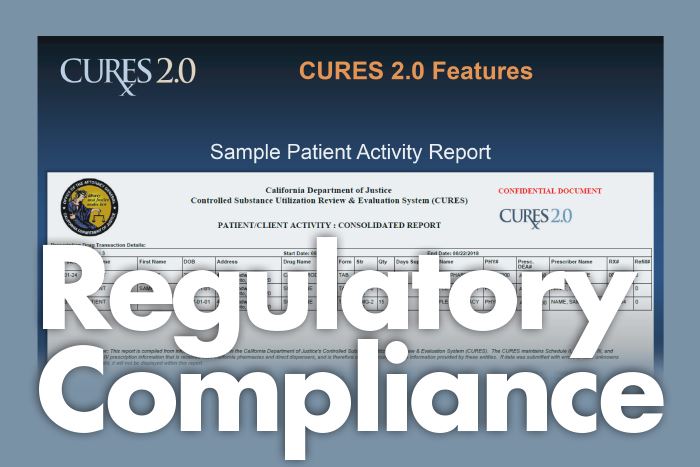California’s Controlled Substance Utilization Review and Evaluation System, also known as CURES 2.0, was certified as ready for statewide use by the Department of Justice in April 2018.
Beginning Oct. 2, 2018, all licensees authorized to prescribe, order, administer, furnish or dispense controlled substances in California must, with some exceptions, check a patient’s prescription history in CURES 2.0 before prescribing a Schedule II-IV substance, as CDA first reported in April.
One notable exemption to mandatory CURES consultation that applies to dental care and that CDA helped secure is summarized:
If a health care practitioner prescribes, orders, administers, or furnishes a controlled substance to a patient as part of the patient’s treatment for a surgical procedure and the quantity of the controlled substance does not exceed a nonrefillable five-day supply of the controlled substance to be used in accordance with the directions for use . . .
When circumstances require dentists to review a patient’s controlled-substance history, they must do so “no earlier than 24 hours, or the previous business day, before prescribing a Schedule II, Schedule III or Schedule IV controlled substance to the patient for the first time and at least once every 4 months thereafter if the substance remains part of the treatment of the patient,” according to Senate Bill 482 signed by Gov. Jerry Brown in September 2016.
Additional exemptions to mandatory CURES consultation that could apply to prescribing dentists include “temporary technological or electrical failure” that restricts a practitioner’s access to CURES, “technological limitations that are not reasonably within the control of the health care practitioner” and if the CURES database is determined by the Department of Justice to be nonoperational. The law states that a health care practitioner should correct the cause of the temporary technological or electrical failure “without undue delay.”
It is recommended that dentists document in their patients’ charts that they checked CURES. Unsuccessful attempts to access CURES and the reasons for not being able to do so must be recorded in patients’ charts.
Prescribers should understand that even if they are exempt from the mandatory CURES consultation, they must still be registered to use CURES if they have a DEA number. The registration deadline was July 1, 2016, as mandated by Assembly Bill 679 signed into law by Gov. Jerry Brown in October 2015.
Noncompliance with either the CURES registration requirement or the mandatory consultation requirement, except as exempted by law, are considered a violation of the Dental Practice Act.
CURES 2.0 aids prescribers and dispensers in identifying fraudulent activity and is intended to reduce prescription drug abuse and diversion without affecting legitimate medical practice or patient care. Tony Park, PharmD, JD, who regularly co-teaches a course on controlled substances at CDA Presents The Art and Science of Dentistry, says prescribers will benefit from checking the database before prescribing a controlled substance in their practice.
“You want to know everything about your patient that you can before prescribing a controlled and highly addictive substance,” Park says.
If not in compliance with the registration requirement, prescribers should register now.
CURES 2.0 webinar trainings
The DOJ offers free one-hour webinars about CURES 2.0 for prescribers. Attendees will learn about new system features such as patient safety alerts and peer messaging and will receive step-by-step instructions on accessing CURES patient activity reports. The last two webinars for the year are scheduled for noon to 1 p.m. on Sept. 26 and Oct. 10. Prescribers can register to attend by visiting the “CURES 2.0 Webinars and Training Bulletin” once logged in to CURES.
CURES-related questions can be directed to the DOJ by email or 916.210.3187.

